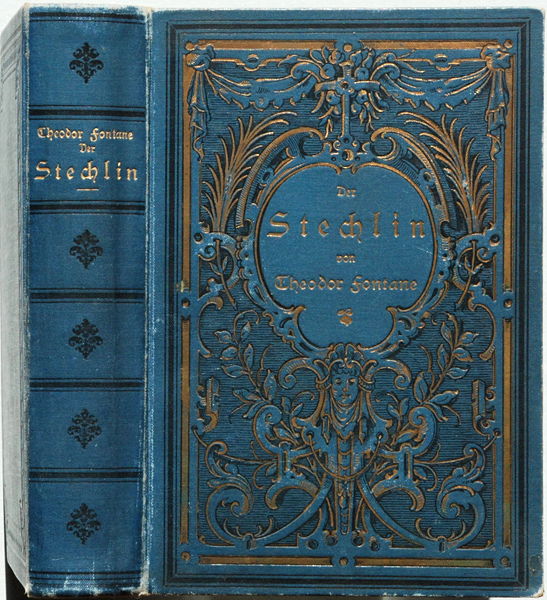“A NEW AGE IS DAWNING”: THEODOR FONTANE’S 1899 NOVEL “THE STECHLIN”
October 10, 2009 at 6:53 am | Posted in Art, Books, Germany, Globalization, Literary, Philosophy, World-system | Leave a commentTheodor Fontane (1819-1898)
Theodor Fontane on Germany’s Historical Epochs and Aristocratic Decline: The Stechlin (1899)
“What was once progress has long since become just the opposite. The old-fashioned battles with all their battalions – even though they still keep on multiplying – they’re disappearing from modern history. From real history, I mean, the kind that’s worth reading about. And if they themselves aren’t disappearing, interest in them is in any case. And along with interest, prestige. In their place it’s inventors and discoverers, and James Watt and Siemens mean more to us than du Guesclin and Bayard. Heroism hasn’t exactly run its course yet, and it won’t have run its course for a long time yet, but it has already passed its own particular high point. Yet instead of coming to terms with this fact, our regime keeps trying to revive artificially something completely on the decline.”
…but right now wherever we look, the sign of these times is a democratic world-view. A new age is dawning.
Theodor Fontane (1819-1898) is regarded by many as the most important (and most enduring) German-language realist writer of the nineteenth century. Fontane’s novel The Stechlin [Der Stechlin] was published in 1899, a year after his death.
That the novel is Fontane’s testament – both literally and figuratively – is somewhat remarkable, for the author himself admitted that nothing extraordinary happens in it. At the end, an old fellow dies, and two young ones get married. It is not the plot that makes the novel special but the conversations, which are characterized by Fontane’s trademark lightness and flow.
The excerpt below includes one such conversation between Pastor Lorenzen and Melusine. Lorenzen identifies the central theme of the novel when he declares, “The primary difference between everything that is modern and the old lies in the fact that people are no longer put in their accorded places by virtue of their birth.” The novel reflects Fontane’s awareness of the fact that the German Empire had already become a modern industrialized state in which the ossified values of the aristocracy were being challenged by bourgeois and working-class claims to economic, cultural, and political ascendancy. Lorenzen is a Protestant clergyman, but he is young and liberal and represents the modern world. The self-effacing, down-to-earth Prussian Junker Dubslav von Stechlin represents the old world, while Melusine – one of Fontane’s most enigmatic female characters – functions as a kind of oracle in the work.
[ . . . ]
I respect what’s been passed down to us. Along with it, of course, what is emerging too, because the very thing that’s emerging will sooner or later itself be something passed down. We should love everything that’s old, as far as it has a claim to our respect, but it’s for the new that we should really and truly live. And above all, as the Stechlin teaches us, never should we forget the great interrelatedness of things. To cut one’s self off is to wall one’s self in, and to wall one’s self in is death. It’s vital that we keep that constantly in mind.”
[ . . . ]
“If only I could tell you how joyfully I put myself at your service, my dearest Countess. And I can do so all the more easily since, as you know, your ideals are the same as mine. I live for them, and I feel it a gift of Providence to immerse myself wholly in the new where the old fails to measure up. And it’s a new thing of that kind that’s at stake here. Whether such a new thing should be – because it must be – or whether it should not be, that’s the question around which everything revolves. Everywhere around us here there are a great number of excellent people, who in all seriousness believe, that whatever has been handed down to us ought to be defended like the temple of Solomon – above all whatever has to do with the church, but not, unfortunately, with what is truly Christian. In our upper classes, moreover, there prevails a naive tendency to consider everything ‘Prussian’ to be a higher cultural form.”
“It’s precisely as you say. And yet to give it its due, permit me to ask if this naive belief doesn’t have a certain justification?”
“At one time it did. But that’s in the past. And that can’t be changed. The primary difference between everything that is modern and the old lies in the fact that people are no longer put in their accorded places by virtue of their birth. They now have the freedom to put their capabilities to use in every direction and in every field. Time was, when people were lords of the manor or linen weavers for three-hundred years. Now any linen weaver has the chance to be the lord of the manor some day.”
“And practically the reverse,” laughed Melusine. “But let’s put that rather delicate topic aside. I’d much, much rather hear what you have to say regarding the value of our way of life and our social forms, about our way of viewing things in general, the permissibility of which, as it seems to me, you so emphatically place in doubt.”
“Not absolutely. If I do doubt, my doubts are directed not so much at the things in themselves, as at the huge measure of faith that is placed in them. That all these mediocre things are viewed as something special and superior, and therefore as something, if can be, to be preserved for all time, that’s what’s bad about it all. What once had validity, should go on being valid, what once was good, should go on being good or even be the best. But that’s impossible, even if all those things, which is by no means the case, either, really did measure up to an ideal concept of power and glory . . . “We’ve had, when we look back on it, three great epochs. That’s something we have to keep in mind. The greatest, perhaps, and at the same time the first, was the one we had under the Soldier King. There was a man who can’t be praised enough; marvelously suited to his times, and at the same time ahead of them. He not only stabilized the kingdom, but what’s even far more important, he created the foundations for a new era, and in place of disorderliness, and self-serving individualism and capricious despotism, he set up order and justice. Justice, there was his best ‘rocher de bronce’.”
“And then?”
“And then came epoch number two. After the first, it was not very long in coming, and this country of ours, so completely without brilliance in its nature and history, suddenly found itself illuminated by the lightning of true genius.”
“That must have elicited quite a bit of amazement.”
“Indeed it did. But more in the world outside than at home. Admiration is an art too, you know. It takes a certain something to recognize greatness for what it is . . . And then came the third era. Not great, but yet rather great after all. That was when this poor, miserable land, that had half fallen into ruin, was lit through, not by genius, but instead by enthusiasm, by faith in the higher power of the spirit, of knowledge, and freedom.”
“Good, Lorenzen. But do go on.”
“And all of what I’ve just recounted covered a century in time. We were ahead of the others in those days, now and then on an intellectual plane and morally for sure. But our Non-soli-cedo eagle, with its bundle of lightning bolts in its claws, doesn’t make lightning any more, and the enthusiasm is dead. A retrograde motion has taken over; something long since dead and buried, I’ve got to say it again, is supposed to bloom anew. But it won’t. In a certain sense, of course, everything does return, but with returns of that sort millennia are passed over; the Roman imperial ages, good or bad, those we can have back again, but not that bamboo cane from Friedrich Wilhelm’s ‘tobacco cabinet.’ Not even the walking stick of Sanssouci. That sort of thing is all over and done with. And a good thing it is.
What was once progress has long since become just the opposite. The old-fashioned battles with all their battalions – even though they still keep on multiplying – they’re disappearing from modern history. From real history, I mean, the kind that’s worth reading about. And if they themselves aren’t disappearing, interest in them is in any case. And along with interest, prestige. In their place it’s inventors and discoverers, and James Watt and Siemens mean more to us than du Guesclin and Bayard. Heroism hasn’t exactly run its course yet, and it won’t have run its course for a long time yet, but it has already passed its own particular high point. Yet instead of coming to terms with this fact, our regime keeps trying to revive artificially something completely on the decline.”
“Things are as you say. But against whom is it directed? You spoke of a ‘regime.’ Who is this regime? A person, or a thing? Is it the machine that’s been taken over from the old times, with its cogs and gears clacking along as if dead, or is it he, who is standing at the machine? Or in the end, is it a certain clearly defined group, who are striving to control, to direct the hand of the man at the machine? In everything you’re saying there resounds a rebellious voice. Are you against the aristocracy? Against the ‘old families?’”
“First off, no. I love the old families, and I’ve got good cause to do so. And I’d almost like to believe everybody loves them. The old families are still popular, even today. But they are wasting and throwing away this empathy, which everybody has need of, every individual and every caste. Our old families are afflicted through and through with the misconception that ‘things can’t go on without them.’ But nothing is further from the truth because things surely will go on without them. They’re no longer the pillars holding everything up, they’re the old stone and moss roof that still goes on straining and pushing down on things, but can’t offer protection against storms any longer. It’s well possible that the days of the aristocracy may come back again some day, but right now wherever we look, the sign of these times is a democratic world view. A new age is dawning. I believe a better and a happier one. But even if it’s not a happier one, at least it’s an age with more oxygen in the air, an age where we can breathe better. And the more freely one can breathe, the more one lives.”
[ . . . ]
“That’s what everyone says. And we’re vain enough to believe it. But that leads us to completely new realms. For the time being, your hand to seal the bargain. And now, after this revolutionary discourse of ours, permit me to make my way back to the cottages of peaceful folk.”
Source of English translation: Theodor Fontane, The Stechlin, translated with an introduction and notes by William L. Zwiebel. Rochester, NY: Camden House (www.camden-house.com), 1995, pp. 226-29.
Original German text reprinted in Theodor Fontane, Werke, Schriften und Briefe [Works, Writings, and Letters], edited by Walter Keitel and Helmuth Nürnberger. Twenty-one volumes in four sections. Section I, Sämtliche Romane, Erzählungen, Gedichte, Nachgelassenes [Complete Novels, Stories, Poems, Posthumously Published Pieces], vol. 5. © 1980 Carl Hanser Verlag: Munich, pp. 270-74.
It was the German novelist Theodor Fontane at the end of the nineteenth century who marvelously expressed the connection between idolatry and envy in his novel Der Stechlin.
This novel describes the breakdown of aristocratic Prussia and the dawn of a democratic age bringing the increase of envy along with it. Universal ambition—everyone is aiming high—was in this novel said to be the “signature of the time.”
Dubslav von Stechlin, an old aristocrat and the main character of this novel incarnates true humanity and Christian humility, who neither belongs to the decaying world of the old aristocracy nor to the dawning new age because of his true good heart reaching out beyond such passing epochs.
At his funeral pastor Lorenzen, his friend, makes clear that it was Stechlin’s rejection of idolatry that protected him against envy. Because he did not worship the Golden Calf his life remained—contrary to that of many other people—free from envy and did not end up in ruin or unhappiness.
There is a broad consensus that Der Stechlin, Fontane’s last novel, constitutes some sort of final and definitive statement of his convictions, a distillation of his experience and wisdom. This view was widely expressed in press reviews of the first edition, (4) and it has since been echoed by numerous critics. (5) Fontane himself signals his aim to convey a particular message by describing the novel as ‘blos eine Idee, die sich einkleidet’, (6) but, tantalizingly, he nowhere states what this idea is, and it has proved notoriously difficult to formulate. (7) Perhaps the best place to begin an attempt to elucidate the idea is the lake which gives the novel its title. The symbolic function of the lake in the story resides in its supernatural quality of being ‘in communication’ with geological upheavals like earthquakes and volcanoes everywhere in the world. When such events take place, it responds by shooting up a jet of water. In reaction to a major catastrophe like the Lisbon earthquake, the jet is replaced by a red cockerel which rises above the surface and crows loudly into the surrounding countryside. (8) The lake’s paramount hermeneutic importance is indicated by Fontane himself: ‘Um diesen See handelt es sich, trotzdem er nur zu Anfang und zu Ende mit etwa 5 Zeilen vorkommt. Er ist das Leitmotiv.’ (9) Elsewhere he describes the lake’s special qualities and then adds, ‘Urn das Thema dreht sich die ganze Geschichte.’ (10) So Lake Stechlin is the all-meaningful symbol, but what does it mean?
What the lake’s magical powers most clearly represent is the spatial connection between great and small. Fontane explains: ‘Wenn in der Welt draussen “was los ist”, wenn auf Island oder auf Java ein Berg Feuer speit und die Erde bebt, so macht der “Stechlin”, klein und unbedeutend wie er ist, die grosse Weltbewegung mit und sprudelt und wirft Strahlen und bildet Trichter.’ (11) Moreover, this communication between the obscure, unremarkable lake and momentous happenings on the world stage works both ways. One day, during their Italian honeymoon, Woldemar von Stechlin and his bride Armgard are on the island of Capri overlooking Sorrento, when they notice a thin line of smoke rising from Vesuvius and hear subdued rumblings from within the volcano. On the following day a letter arrives informing them of the death in his home at Stechlin of Woldemar’s father Dubslav (p. 384).
The dichotomy thus symbolized by the lake between the ‘local’ and the ‘global’, or between ‘Enge’ and ‘Weite’, provides a metaphor of broad compass, one which meaningfully draws together the lengthy discussions in the novel about the relative merits of the parochial (indigenous people, vernacular speech, homespun wisdom) and the cosmopolitan (liberal internationalism, sophisticated manners, cultivated tastes). (12) This spatial opposition is matched by a temporal dichotomy between the ‘old’ and the ‘new’, stability and change, which informs conversations on a wide variety of topics, such as medicine, technology, religion, heroism, painting, music, and literature. This second dichotomy is also represented symbolically by the lake, which is a thing of permanence and yet, with its red cockerel, earns the reputation of being a ‘revolutionary’ (pp. 54, 266). (13)
Like the concepts ‘local’ and ‘global’, the ‘old’ and the ‘new’ exist only in relation to each other. In both dichotomies the polarity itself is less significant than the necessary connections between the poles, and it is this connectedness, above all, for which the lake stands. The prominence of the theme of interrelatedness is clear from the attention devoted to it by the novel’s major characters. Most important perhaps is the exchange in Chapter 29 between Pastor Lorenzen and Melusine von Barby, and the crucial words are spoken by Melusine:
“Ich respektiere das Gegebene. Daneben aber freilich auch das Werdende, denn eben dies Werdende wird fiber kurz oder lang abermals ein Gegebenes sein. Alles Alte, soweit es Anspruch darauf hat, sollen wir lieben, aber fur das Neue sollen wir recht eigentlich leben. Und vor allem sollen wir, wie der Stechlin uns lehrt, den grossen Zusammenhang der Dinge nie vergessen.”
There is, then, a deep kinship between the two Stechlins, the lake and the man. For the interrelatedness represented by the lake and the Gesinnung embodied by Dubslav are complementary.
Theodor Fontane (1819-1898) is regarded by many as the most important (and most enduring) German-language realist writer of the nineteenth century. Fontane’s novel The Stechlin [Der Stechlin] was published in 1899, a year after his death.
“FINANCIAL TIMES” LONDON: NEW SAMUEL BRITTAN PIECE
October 10, 2009 at 2:04 am | Posted in Economics, Financial, Research, United Kingdom | Leave a commentNew Samuel Brittan article:
A cool look at the current deficit
hysteria
Fri 10/09/09
The Financial Times 02/10/09
A cool look at the current deficit hysteria
The British political classes are going through one of their occasional bouts of masochism, with party leaders vying with each other on the theme of who can cut public spending faster and more effectively. Spice is added by talk of leaks and secret plans; and ideology by arguing about the balance between tax increases and spending curbs. My own bottom line is that all this is in response to a largely imaginary budget crisis. If we have a normal economic recovery the red ink will diminish remarkably quickly. If we don’t, it won’t and won’t need to.
http://www.samuelbrittan.co.uk
New Samuel Brittan article:
A cool look at the current deficit hysteria
Fri 10/09/09
The Financial Times 02/10/09










